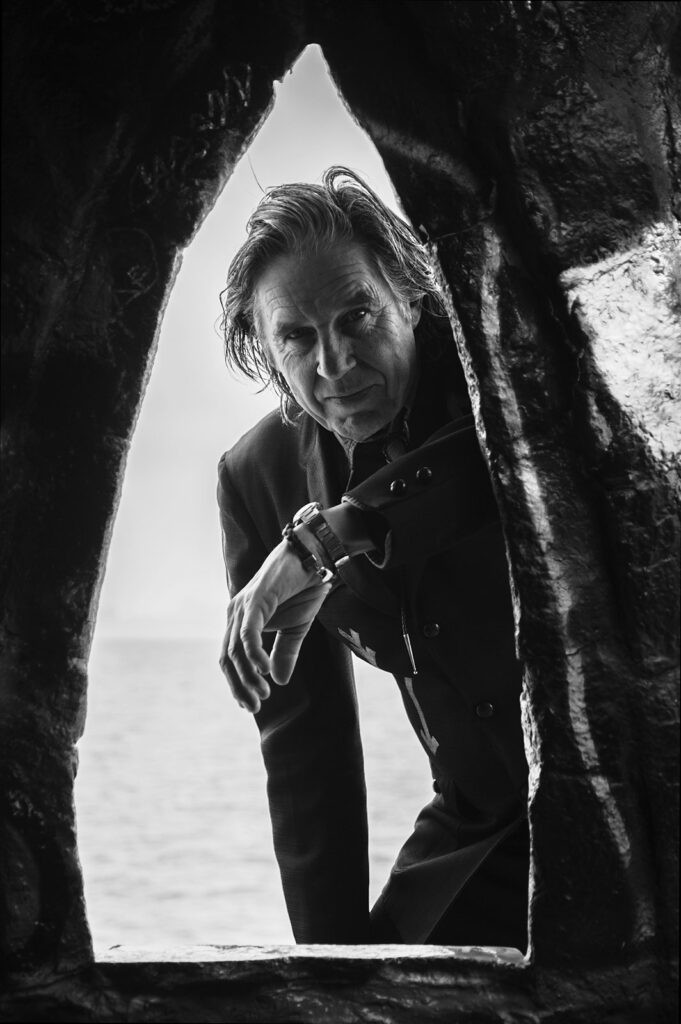When X burst onto the Los Angeles music scene in 1980, they weren’t just another punk band; they were a revelation. Their debut album defied expectations, particularly with the distinctive interplay of male and female vocals from John And Doe, creating a sonic push and pull as dynamic as a horse race. This energy was amplified by the band’s instrumentalists, who infused punk’s raw power with a rockabilly swagger.
The lyrics were equally groundbreaking. Eschewing traditional rhymes, they were raw, poetic narratives inspired by the Beat generation and the gritty realism of Charles Bukowski. Lines like, “Tonight you’ll fall asleep in clothes, so late like a candy bar wrapped up for lunch. That’s all you get to taste: poverty and spit,” from “Nausea,” painted stark pictures of urban life. Even the album title, Los Angeles, declared a shift in punk’s geography, signaling the rise of West Coast punk and challenging the dominance of New York and London.
 John Doe of the band X, captured in a portrait reflecting his punk rock ethos and artistic depth, highlighting his significant contribution to music and literature.
John Doe of the band X, captured in a portrait reflecting his punk rock ethos and artistic depth, highlighting his significant contribution to music and literature.
The man at the heart of this vocal duo, John Doe, born John Duchac, is a 1975 graduate of Antioch University Maryland. His double major in poetry and American Literature from Antioch wasn’t just a footnote in his biography; it was a foundational element of his artistic identity. At Antioch’s Maryland campuses, working closely with poet Grace Cavalieri, now Maryland’s Poet Laureate, Doe honed the skills and gained the confidence to co-write the lyrics that became synonymous with X’s unique sound.
“Antioch played a huge role,” John Doe reflects. “I learned how to listen, how to write. Every time I’m writing anything—songs, poems, books—I think of stuff Grace taught me: how to be truthful, how to get to the core of things, how to know what’s good and what’s not good.” He emphasizes the unique learning environment at Antioch, “taking those classes at night with young kids mixed in with adults working in hospitals or for the city, having that mix, even though we weren’t all best friends, it felt good, like this was America.” This diverse and grounded atmosphere fostered a sense of real-world connection that permeated his artistic approach.
Doe’s path to Antioch was unconventional. He initially attended George Washington University but found himself disillusioned with the pre-med focused, high-pressure environment. Seeking something more, he discovered the Theatre Project, an alternative theater space connected to Antioch. This sparked his interest in the university and led him to enroll, seeking a more stimulating and creatively aligned community.
“It all made me understand what a scene was like. I enjoyed that, and I wanted to be part of a music scene when I moved to L.A.”
At Antioch, John Doe not only benefited from Cavalieri’s mentorship but also actively contributed to the literary scene. He and fellow students launched the Poetry Project, organizing workshops and readings at the Theatre Project. Their literary explorations extended beyond campus, regularly venturing into Washington, D.C., to engage with the city’s vibrant poetry scene led by figures like Michael Lally and Terry Winch.
 A black and white candid shot of John Doe and Exene Cervenka in their early years, embodying the raw energy and artistic partnership that defined X and their impact on the punk rock movement.
A black and white candid shot of John Doe and Exene Cervenka in their early years, embodying the raw energy and artistic partnership that defined X and their impact on the punk rock movement.
“Those D.C. poets were creating poetry meant to be spoken out loud,” Doe recalls, “poetry that was irreverent and funny, not fussy and old. That went hand in hand.” This ethos resonated deeply with him, further solidified by the bohemian atmosphere of Baltimore, with figures like John Waters, the Fells Point neighborhood, and the Poetry Project all contributing to his desire for a life lived authentically and creatively. “Baltimore, where John Waters, Fells Point, and the Poetry Project were, just reinforced my desire for a bohemian lifestyle of not giving a shit and living life the way you wanted to. It all made me understand what a scene was like. I enjoyed that, and I wanted to be part of a music scene when I moved to L.A.”
When his Maryland band relocated to Los Angeles, the pursuit of fame and musical expression intensified. While his bandmates’ interests diverged, Duchac, soon to be known as John Doe, was captivated by the burgeoning punk rock scene in Southern California. He then formed a new band with guitarist Billy Zoom and bassist D.J. Bonebrake, embracing stage names that reflected the spirit of the era.
Simultaneously, Doe immersed himself in the Venice Poetry Workshop at Beyond Baroque, a literary center that nurtured poets of all styles. It was there he encountered Christine Cervenka, a young poet and typesetter living at Beyond Baroque. He recognized an immediate spark in her poetic voice and unique perspective. When she joined X, she adopted the name Exene Cervenka, completing the iconic vocal duo of John and Doe.
“I could see at once that she was an interesting person,” John Doe remembers of Exene. “She had an innate ability to listen to that internal voice and put it on paper. And she had that sense of wordplay that you can’t learn. And she had enough personal experience to write about—her mother passed away early; she had plenty of demons.”
He recounts the early collaboration, “She had a piece called, ‘I’m Coming Over,’ that she would sing. I asked if I could sing it in a band I was starting with Billy Zoom. She said, ‘No, it’s the one thing I have of any value, and I’m not going to give it to you. If anyone’s going to sing it, it’s going to be me.’ And I thought, ‘Well, why not?’ Before I put chords to it, it already had a verse-chorus structure.” This initial creative spark ignited a partnership that would define X’s sound.
John Doe and Exene married in 1980, coinciding with X’s rise. Their first two albums, Los Angeles and Wild Gift, were produced by Ray Manzarek of The Doors, further cementing their place in rock history. Despite critical acclaim and signing with Elektra Records in 1982, mainstream radio success remained elusive. Doe and Cervenka divorced in 1985, and band dynamics shifted over the years, but the core musical vision endured.
X continued to create music, with albums like See How We Are (1987) standing out as a fan favorite. Though the band initially disbanded in 1998, the original lineup reunited in 2004 and has been touring ever since, a testament to their enduring appeal. Marking the 40th anniversary of Los Angeles, X released Alphabetland in 2020, their first new studio album in 27 years, which recaptured the raw energy of their debut and was met with enthusiastic reviews.
Beyond X, John Doe has cultivated a multifaceted career. With eight studio albums with X, two with the Knitters, and 13 solo albums, alongside two books about the L.A. music scene and acting roles in film and television, his artistic output is prolific and diverse. Throughout it all, the foundational lessons from Antioch University and the mentorship of Grace Cavalieri remain significant.
“I owe Grace so much,” he concludes, “because of her style of teaching. I’ve applied that to every band I’ve been in, to everyone who ever asked me if I liked their song. She always found a positive way to say what was working and what wasn’t working in a poem. She was never afraid to be very sensitive; she was an incredible mentor.” Antioch’s nurturing environment and Cavalieri’s guidance provided John Doe with the artistic tools and confidence that shaped not only his distinctive voice but also the very fabric of X and their lasting impact on punk rock.

